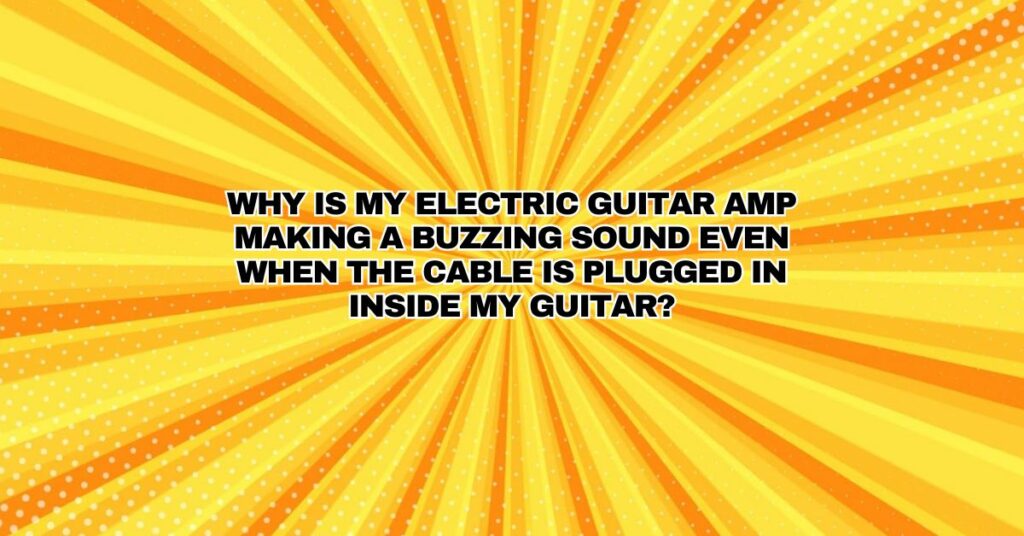Experiencing a buzzing sound from your electric guitar amplifier, even when the cable is plugged into your guitar, can be both frustrating and disruptive to your playing experience. This issue is a common occurrence among guitarists and can result from various factors. In this article, we will explore the potential causes of buzzing or humming sounds in your guitar amplifier and provide guidance on how to identify and address these problems.
1. Grounding Issues:
Grounding problems are a leading cause of unwanted buzzing or humming in guitar amplifiers. When a proper ground connection is not established, interference and noise can infiltrate the signal path. Here’s how to address grounding issues:
- Check Power Outlets: Ensure that the power outlet to which your amplifier is connected is properly grounded. Ungrounded outlets can contribute to noise issues. Consider using a power conditioner or a grounded power strip to provide clean and consistent power to your gear.
- Grounded Cables: Verify that all the cables in your signal chain are properly grounded. Using high-quality, shielded instrument cables can help reduce the risk of interference.
- Proper Guitar Grounding: Make sure your electric guitar’s internal wiring is correctly grounded. Loose or disconnected ground wires in your guitar can introduce noise into the signal. Consult a guitar technician if you suspect issues with your guitar’s grounding.
2. Interference from Electronic Devices:
Electronic devices and appliances, such as smartphones, laptops, fluorescent lights, or Wi-Fi routers, can emit electromagnetic interference (EMI) that your amplifier may pick up, resulting in buzzing or humming sounds.
- Distance from Interference Sources: Position your amplifier and guitar away from potential sources of EMI. Reducing the proximity between your gear and electronic devices can minimize interference.
- Use Quality Cables: Invest in high-quality, shielded instrument cables to help block out EMI.
- Power Conditioners: Power conditioners can filter out electrical noise, providing clean and consistent power to your equipment. This can significantly reduce the impact of external interference.
3. Pickup and Electronics Problems:
Internal issues within your guitar, particularly with the pickups or wiring, can contribute to buzzing or humming noises.
- Grounding at the Jack: Check the output jack of your electric guitar for loose or disconnected wires. A faulty jack connection can cause noise issues.
- Wiring Inspection: Examine the internal wiring of your guitar for loose or damaged connections. Consult a professional technician to address any issues found.
4. Amp and Speaker Issues:
Problems within the amplifier and the speaker can also be responsible for unwanted buzzing sounds.
- Microphonic Tubes: If your amplifier uses vacuum tubes, microphonic tubes can pick up and amplify external noises, creating buzzing. Identify and replace any microphonic tubes to eliminate this issue.
- Speaker Problems: Inspect the speaker for visible damage, such as a torn cone or loose connections. Damaged speakers can produce buzzing sounds.
5. Effects Pedals and Signal Chain:
Sometimes, buzzing sounds can be introduced by your effects pedals or the components in your signal chain. Troubleshoot the following:
- Effects Chain Order: The order of your effects pedals can impact noise levels. For example, placing a noisy distortion pedal before a noise gate can make the gate less effective in reducing noise. Experiment with different effect orders to find the optimal setup.
- Battery-Powered Pedals: If you’re using battery-powered pedals, ensure that the batteries are fresh and not causing interference. Switch to a reliable power supply to eliminate potential noise issues.
6. Feedback and Guitar Techniques:
Certain guitar techniques and settings can lead to feedback or unwanted buzzing. These include high gain settings, proximity to the amplifier, or improper microphone placement in a live sound situation.
- Amp and Gain Settings: Lower the gain settings on your amplifier if they are excessively high. Reducing the gain can minimize feedback and noise, especially when playing at high volumes.
- Mic Placement: If you’re using a microphone to amplify your guitar, ensure that it’s correctly positioned and not too close to the amplifier’s speaker. Adjusting the microphone position can help mitigate feedback.
7. Professional Inspection:
If you’ve gone through the above steps and the buzzing issue persists, or if you’re uncomfortable with diagnosing and repairing the problem yourself, it’s advisable to consult a professional guitar technician or amplifier repair specialist. They can perform a thorough inspection of your gear, diagnose the issue, and make the necessary repairs to ensure that your amplifier functions without unwanted noise.
In conclusion, a buzzing sound in your electric guitar amplifier, even when the cable is plugged into your guitar, can result from a variety of factors, including grounding issues, interference from electronic devices, internal guitar or amplifier problems, effects pedal setups, and feedback-inducing settings. By methodically troubleshooting these potential causes and taking appropriate steps to address each one, you can often identify and resolve the issue, allowing you to enjoy clean and noise-free guitar playing.


